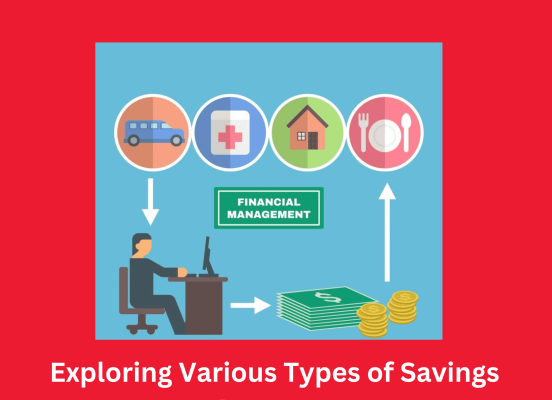
Exploring Various Types of Savings Accounts: From Traditional to High-Yield Options
- By admin --
- Wednesday, 13 Mar, 2024
Introduction:
Savings accounts play a fundamental role in personal finance, serving as a secure haven for storing cash and earning interest. However, not all savings accounts are created equal. In this comprehensive exploration, we delve into different types of savings accounts, including traditional savings accounts, high-yield savings accounts, money market accounts, and certificates of deposit (CDs). Understanding the features, benefits, and considerations of each type can empower individuals to make informed decisions regarding their savings strategies.
Traditional Savings Accounts:
Traditional savings accounts are offered by banks and credit unions and are perhaps the most common type of savings vehicle. They typically offer low to moderate interest rates, making them suitable for short-term savings goals and emergency funds. Traditional savings accounts often have minimal balance requirements and easy access to funds, making them convenient for everyday banking needs.
High-Yield Savings Accounts:
High-yield savings accounts, also known as online savings accounts, offer significantly higher interest rates compared to traditional savings accounts. These accounts are typically offered by online banks, which have lower overhead costs compared to brick-and-mortar institutions. The higher interest rates enable savers to earn more on their deposits, making high-yield savings accounts an attractive option for maximizing returns on cash reserves.
Money Market Accounts:
Money market accounts (MMAs) are a hybrid between savings and checking accounts, offering both interest-bearing features and limited check-writing capabilities. MMAs typically require higher minimum balances compared to traditional savings accounts but offer higher interest rates in return. These accounts often come with additional perks such as ATM access and debit cards, making them suitable for individuals seeking liquidity and modest interest earnings.
Certificates of Deposit (CDs):
Certificates of deposit (CDs) are time-based deposits offered by banks and credit unions. When you open a CD, you agree to deposit a certain amount of money for a specified term, ranging from a few months to several years. In exchange, the financial institution guarantees a fixed interest rate for the duration of the CD term. CDs typically offer higher interest rates compared to savings accounts, especially for longer terms. However, withdrawing funds from a CD before the maturity date may result in penalties, making them less flexible compared to other savings options.
Choosing the Right Savings Account:
When selecting a savings account, it's essential to consider various factors such as interest rates, fees, accessibility, and FDIC or NCUA insurance coverage. Here are some key considerations to keep in mind:
1.Interest Rates:
Compare interest rates offered by different types of savings accounts to maximize your earnings potential. High-yield savings accounts and CDs generally offer higher rates compared to traditional savings accounts and MMAs.
2.Fees:
Be aware of any fees associated with maintaining a savings account, such as monthly maintenance fees, excessive withdrawal fees, or early withdrawal penalties for CDs. Opt for accounts with minimal or no fees to avoid eroding your savings.
3.Accessibility:
Evaluate the accessibility of funds based on your needs and preferences. Traditional savings accounts and MMAs typically offer easy access to funds through ATMs, online banking, and mobile apps. CDs, on the other hand, have limited liquidity due to their fixed terms.
4.FDIC or NCUA Insurance:
Ensure that your savings accounts are insured by the Federal Deposit Insurance Corporation (FDIC) or the National Credit Union Administration (NCUA) up to the maximum allowable limits. This insurance provides protection against bank or credit union failures, safeguarding your deposits.
Conclusion:
Different types of savings accounts cater to varying needs and preferences, offering a range of features, interest rates, and terms. Whether you prioritize liquidity, interest earnings, or a combination of both, there's a savings account to suit your financial goals. By understanding the characteristics of traditional savings accounts, high-yield savings accounts, money market accounts, and certificates of deposit, you can make informed decisions that align with your savings objectives and contribute to your overall financial well-being.





